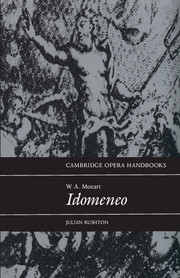Book contents
- Frontmatter
- Contents
- List of illustrations
- General preface
- Acknowledgements
- Introdution
- 1 Synopsis
- 2 Genesis of an operone
- 3 ‘Madame Dorothea Wendling is arcicontentissima’: the performers of Idomeneo
- 4 The genre of Idomeneo
- 5 From myth to libretto
- 6 Idomeneo after Mozart
- 7 General structure of Idomeneo
- 8 Two soliloquies
- 9 The musical language of Idomeneo
- 10 Tonality and motive
- 11 Elettra's first aria and the storm scene
- 12 Conclusions
- Notes
- Select bibliography
- Index
- Plate section
- Frontmatter
- Contents
- List of illustrations
- General preface
- Acknowledgements
- Introdution
- 1 Synopsis
- 2 Genesis of an operone
- 3 ‘Madame Dorothea Wendling is arcicontentissima’: the performers of Idomeneo
- 4 The genre of Idomeneo
- 5 From myth to libretto
- 6 Idomeneo after Mozart
- 7 General structure of Idomeneo
- 8 Two soliloquies
- 9 The musical language of Idomeneo
- 10 Tonality and motive
- 11 Elettra's first aria and the storm scene
- 12 Conclusions
- Notes
- Select bibliography
- Index
- Plate section
Summary
The ‘argument’
The argomento in the printed libretto conveys Varesco's idea of the essential content of the drama. The following translation is nearly literal, but breaks up Varesco's interminable sentences.
Idomeneo, King of Crete, was among the most celebrated heroes who dealt the last death-blow to famous Troy. Returning by sea in glory to his own kingdom, he was overtaken, quite near the port of Sidon, by such a powerful storm that, overcome with terror, he vowed to Neptune that he would sacrifice whatever man he should meet first after reaching shore, if only he and his men were allowed to survive the imminent shipwreck. His son Idamante, wrongly informed of the death of his beloved father, ran to the coast, inconsolable, but perhaps hoping to find some happier news there; by mishap he was the first to meet his father, who, his prayer having been answered by the Sea God, was wandering alone awaiting the promised victim.
The long absence of Idomeneo from his native land, where he had left his son a mere child, meant that neither recognised the other until after an extended conversation.
Idamante loved Princess Ilia, daughter of Priam, King of Troy, whom by courageous action he had saved from a fierce storm when she was arriving, a prisoner, in Crete; she in turn tenderly loved him.
Princess Elettra, daughter of Agamemnon, King of Argos, was a refugee in Crete because of the tragic events in her homeland; she was in love with Idamante, but he did not return her love. […]
- Type
- Chapter
- Information
- W. A. Mozart: Idomeneo , pp. 4 - 24Publisher: Cambridge University PressPrint publication year: 1993

